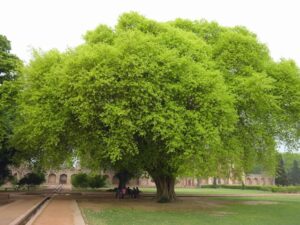Physical Address
23,24,25 & 26, 2nd Floor, Software Technology Park India, Opp: Garware Stadium,MIDC, Chikalthana, Aurangabad, Maharashtra – 431001 India
Physical Address
23,24,25 & 26, 2nd Floor, Software Technology Park India, Opp: Garware Stadium,MIDC, Chikalthana, Aurangabad, Maharashtra – 431001 India

In a major step toward enhancing urban greenery, the Government of India has successfully sanctioned 111 city forests or “Nagar Vans” in 100 days, surpassing its initial intention of a hundred.. This city wooded area initiative beneath the Ministry of Environment, Forest and Climate Change (MoEFCC) is part of a broader dedication to create 1,000 Nagar Vans nationwide by 2027. The initiative aims to improve air pleas, guide weather resilience, and grow city livability by encouraging citizen participation and promoting biodiversity.
111 Nagar Vans Approved: A Closer Look at the Initiative
The Nagar Van Yojana’s intention to set up 100 city forests in a hundred days was surpassed with the approval of 111 city forests. These green spaces were selected based on a rigorous process considering environmental challenges, population density, and existing green cover. The approved tasks span numerous towns, from Maharashtra to Haryana, aiming to enhance the quality of life for urban populations.
These urban forests are not just a green initiative but a testament to the power of community. Residents, students, and private enterprises are encouraged and integral to this initiative’s success. Their active participation in planting and protecting these forests instills a sense of ownership, ensuring the long-term sustainability of these urban forests. Focusing on local, medicinal, and fruit-bearing species fosters an environmentally balanced and healthy urban habitat, and citizens are at the heart of this transformation.
The plan to build walking trails, nurseries, and educational centres is a positive step toward making these spaces multifunctional. Still, care must be taken to ensure that these infrastructure projects are consistent with the core goal of preserving natural habitats. The success of this initiative will depend heavily on active community involvement and local stewardship. The idea that this is a collective effort should move beyond lip service—citizen engagement and long-term local participation are critical to these forests’ sustainability and real impact.
Financial and Community Support: Ensuring Longevity of the Nagar Van Yojana
While Nagar Van Yojana’s financial model seems robust, the ₹4 lakhs per hectare funding may not be sufficient in all urban settings, particularly in densely populated cities with high land and labour costs. The minimum requirement of 10 hectares per forest is commendable, but the challenge lies in maintaining these forests beyond the initial funding.
The success of the Nagar Van initiative is highly dependent on active community involvement. Urban Local Bodies (ULBs) and municipal corporations play a pivotal role in planning, implementing, and sustaining these forests. Their engagement ensures these green spaces are created, adequately maintained, and integrated into the city’s infrastructure. However, these forests could avoid neglect with a consistent, long-term commitment.
Citizens are encouraged to participate in tree planting and environmental stewardship, which fosters a sense of ownership and responsibility. Including natural gardens and biodiversity parks further promotes interaction with local communities, offering educational opportunities and environmental awareness. Yet, the challenge lies in maintaining consistent public interest over time, ensuring that this initiative doesn’t become just another temporary environmental effort but a sustainable movement.
The government’s ambitious plan to establish 1,000 urban forests by 2027 reflects a significant commitment to enhancing urban climate resilience and biodiversity. This long-term initiative aligns with India’s broader environmental strategy, positioning these forests as natural solutions to pressing urban challenges like increasing temperatures, air pollution, and water runoff.
Funded by the National Compensatory Afforestation Management and Planning Authority (CAMPA), these urban forests will serve as essential green lungs for densely populated areas, offering vital ecosystem services. However, realising this goal requires meticulous planning, sustained financial backing, and continuous community involvement to ensure these forests flourish and become integral parts of the urban landscape.
Achieving this scale of urban reforestation will necessitate overcoming bureaucratic hurdles, securing ongoing funding, and creating public awareness campaigns that keep citizens engaged over the long term. This project could set a global precedent for integrating nature into cities and building climate-resilient, sustainable urban environments if executed well.
Ek Ped Maa Ke Naam: A Nationwide Campaign
On World Environment Day 2024, Prime Minister Narendra Modi introduced the “Ek Ped Maa Ke Naam” initiative, encouraging citizens to plant trees in honour of their mothers. This unique blend of environmental activism and cultural reverence aims to inspire a deeper public connection to nature. The campaign has gained immense traction, with 75 crore saplings planted, setting a goal of 140 crore trees by March 2025.
To enhance public engagement, Union Minister Jyotiraditya Scindia launched the “Ek Ped Maa Ke Naam” mobile app on 23 September, streamlining participation and tracking progress. The app enables users to register trees they’ve planted, share their stories, and encourage others to join the cause. This digital boost has helped widen the campaign’s reach, drawing in participants across India.
The campaign’s symbolic message of linking motherhood with environmental care resonates deeply, offering a personal stake in the global fight against climate change. With active public involvement, this initiative has the potential to become a landmark movement in India’s push for sustainability and green development.
This tree-planting initiative amplifies the broader objectives of the Nagar Van Yojana by actively involving citizens in large-scale afforestation efforts. It raises environmental awareness and fosters a sense of personal responsibility in combating climate change. By blending cultural values with sustainability, the “Ek Ped Maa Ke Naam” campaign strengthens India’s resolve to fight desertification and reverse land degradation. This alignment of tradition with environmental action adds a deeper, more personal connection to the nation’s commitment to restoring ecosystems and promoting green growth.
References:
https://pib.gov.in/PressReleseDetailm.aspx?PRID=2057503
https://forestsclearance.nic.in/writereaddata/FAC_Agenda/AboutCAMPA.pdf
https://www.pmindia.gov.in/en/news_updates/pm-launches-ek-ped-maa-ke-naam-campaign
Banner image:
Photo by Joydeep Sensarma on Unsplash